Plot
This article needs a plot summary.(December 2023) |
| Roger Touhy, Gangster | |
|---|---|
| Directed by | Robert Florey |
| Written by | Jerome Cody Crane Wilbur |
| Produced by | Lee S. Marcus |
| Cinematography | Glen MacWilliams |
| Edited by | Harry Reynolds |
| Music by | Hugo Friedhofer |
| Distributed by | 20th Century Fox |
Release date |
|
Running time | 65 min. |
| Country | United States |
| Language | English |
Roger Touhy, Gangster is a 1944 American gangster film based on the life of Chicago mob figure Roger Touhy, directed by film noir specialist Robert Florey.
Parts of the film were shot at Stateville Correctional Center near Joliet, Illinois, where Touhy himself was serving time. Although the story was fictionalized, Touhy successfully sued the studio for defamation of character. After six years, he won a judgment of $15,000, although Fox was able to profitably distribute the film overseas without legal repercussions. [1]
This article needs a plot summary.(December 2023) |
Robert Florey was a French-American director, screenwriter, film journalist and actor.
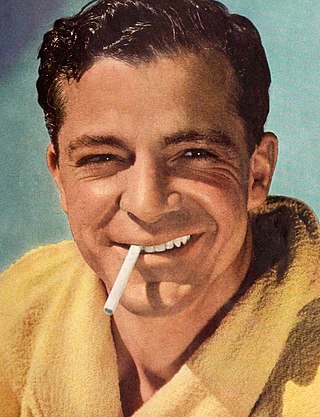
Carver Dana Andrews was an American film actor who became a major star in what is now known as film noir. A leading man during the 1940s, he continued acting in less prestigious roles and character parts into the 1980s. He is best known for his portrayal of obsessed police detective Mark McPherson in the noir Laura (1944) and his critically acclaimed performance as World War II veteran Fred Derry in The Best Years of Our Lives (1946).
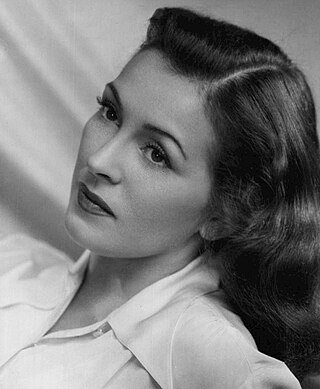
Nancy Kelly was an American actress in film, theater, and television. A child actress and model, she was a repertory cast member of CBS Radio's The March of Time, and appeared in several films in the late 1920s. She became a leading lady upon returning to the screen in the late 1930s, while still in her teens, and made two dozen movies between 1938 and 1946, including portraying Tyrone Power's love interest in the classic Jesse James (1939), which also featured Henry Fonda, and playing opposite Spencer Tracy in Stanley and Livingstone, later that same year. After turning to the stage in the late 1940s, she had her greatest success in a character role, the distraught mother in The Bad Seed, receiving a Tony Award for Best Actress in a Play for the 1955 stage production and an Academy Award nomination as Best Actress for the 1956 film adaptation, her last film role. Kelly then worked regularly in television until 1963, then took over the role of Martha in the original Broadway production of Who's Afraid of Virginia Woolf? for several months. She returned to television for a handful of appearances in the mid-1970s.
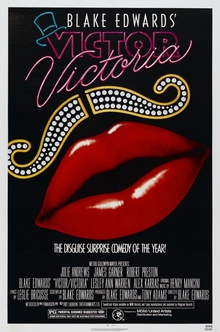
Victor/Victoria is a 1982 musical comedy film written and directed by Blake Edwards and starring Julie Andrews, James Garner, Robert Preston, Lesley Ann Warren, Alex Karras, and John Rhys-Davies. The film was released by Metro-Goldwyn-Mayer, produced by Tony Adams and scored by Henry Mancini, with lyrics by Leslie Bricusse. Victor/Victoria was adapted as a Broadway musical in 1995. The film was nominated for seven Academy Awards and won the Academy Award for Best Original Song Score or Adaptation Score. It is a remake of the 1933 German film Victor and Victoria.

The Biograph Theater on Lincoln Avenue in the Lincoln Park neighborhood of Chicago, Illinois, was originally a movie theater but now presents live productions. It gained early notoriety as the location where bank robber John Dillinger was leaving when he was shot down by FBI agents, after he watched a gangster movie there on July 22, 1934. The theater is on the National Register of Historic Places and was designated a Chicago Landmark on March 28, 2001.

Silver Streak is a 1976 American thriller comedy film, about a murder on a Los Angeles-to-Chicago train journey. It was directed by Arthur Hiller, written by Colin Higgins, and stars Gene Wilder, Jill Clayburgh, and Richard Pryor, with Patrick McGoohan, Ned Beatty, Clifton James, Ray Walston, Scatman Crothers, and Richard Kiel in supporting roles. The film score is by Henry Mancini. This film marked the first pairing of Wilder and Pryor, who were later paired in three other films.
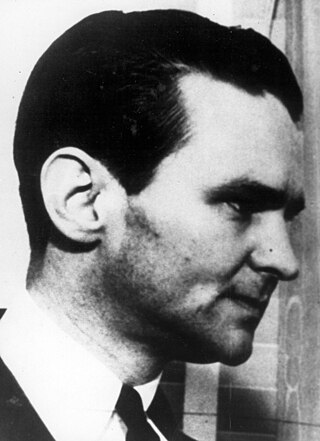
Melvin Horace Purvis II was an FBI agent instrumental in capturing bank robbers John Dillinger and Pretty Boy Floyd in 1934. All of this would later overshadow his military career which saw him directly involved with General George Patton, Hermann Göring, and the Nuremberg Trials.

Frank Ralph Nitto, known as Frank Nitti, was an Italian-American organized crime figure based in Chicago. Bodyguard of Al Capone, Nitti was in charge of all money flowing through the operation. Nitti later succeeded Capone as acting boss of the Chicago Outfit.
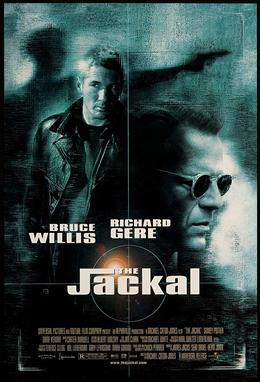
The Jackal is a 1997 American action thriller film directed by Michael Caton-Jones, and starring Bruce Willis, Richard Gere, and Sidney Poitier in his final theatrically released film role. The film involves the hunt for a paid assassin. It is a loose take on the 1973 film The Day of the Jackal, which starred Edward Fox, and was based on the 1971 novel of the same name by Frederick Forsyth. Although the film earned mostly negative reviews from critics, it was a commercial success and grossed $159.3 million worldwide against a $60 million budget.

Married to the Mob is a 1988 American crime comedy film directed by Jonathan Demme, and starring Michelle Pfeiffer, Matthew Modine, Dean Stockwell, Mercedes Ruehl, and Alec Baldwin. Pfeiffer plays Angela de Marco, a gangster's widow from Brooklyn, opposite Modine as the undercover FBI agent assigned the task of investigating her mafia connections.

Preston Stratton Foster, was an American actor of stage, film, radio, and television, whose career spanned nearly four decades. He also had a career as a vocalist.

Dillinger is a 1973 American biographical gangster film, dramatizing the life and criminal exploits of notorious bank robber John Dillinger. It is written and directed by John Milius in his feature directorial debut, and stars Warren Oates as Dillinger, Ben Johnson as FBI Agent Melvin Purvis, and Michelle Phillips in her first film performance as Dillinger's moll Billie Frechette. Other actors in the film include Cloris Leachman, Harry Dean Stanton, and Richard Dreyfuss.
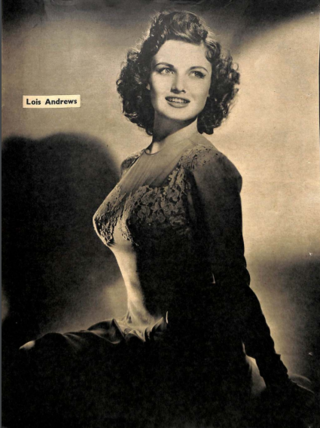
Lois Andrews was an American actress who played in films during the 1940s and early 1950s.

Roger Touhy was an Irish American mob boss and prohibition-era Chicago bootlegger. He is best remembered for having been framed by his rivals in Chicago organized crime for the fake 1933 kidnapping of Jewish-American organized crime figure and Chicago Outfit associate John "Jake the Barber" Factor, a brother of cosmetics manufacturer Max Factor Sr.
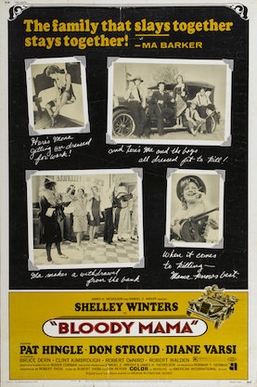
Bloody Mama is a 1970 American exploitation crime film directed by Roger Corman, and starring Shelley Winters in the title role, with Bruce Dern, Don Stroud, Robert Walden, Alex Nicol and Robert De Niro in supporting roles. It was very loosely based on the real story of Ma Barker, who is depicted as a corrupt, mentally-disturbed mother who encourages and organizes the criminality of her four adult sons in Depression-era southern United States.

Reed Hadley was an American film, television and radio actor.

The In-Laws is a 2003 American action comedy film starring Michael Douglas, Albert Brooks, Robin Tunney, Ryan Reynolds and Candice Bergen. The film is a remake of the original 1979 cult classic of the same name. Scenes for the 2003 film were shot on location in Chicago. The film was a box office failure and received mixed to negative reviews.
William Jackson, also known as Action Jackson was an enforcer and loan collector for the Chicago Outfit. He earned his nickname of "Action" because it was slang for "Juice Man", which meant debt-collector. He was tortured to death by his fellow gangsters, allegedly on suspicion that he had become an informant for the FBI.
Jeremiah J. Horan was an organized crime figure and President of the Building Service Employees International Union from 1927 until his death in 1937. Although praised by newspapers for reducing the level of overt violence and graft which plagued the union under his predecessor, William Quesse, Horan nonetheless still engaged in bribery, extortion, physical intimidation, and other crimes, and permitted George Scalise to enter and rise within the organization. Horan established the kickback scheme whereby Scalise would eventually loot the union treasury of millions of dollars in member dues.

Basil Hugh "The Owl" Banghart Jr. was an American criminal, burglar, and prison escape artist. Although a successful "stickup artist" during the 1920s and early 1930s, he is best remembered for his involvement in the hoax kidnapping of Chicago mobster Jake "the Barber" Factor, a crime for which Roger Touhy and he were eventually proven innocent after nearly 20 years in prison.